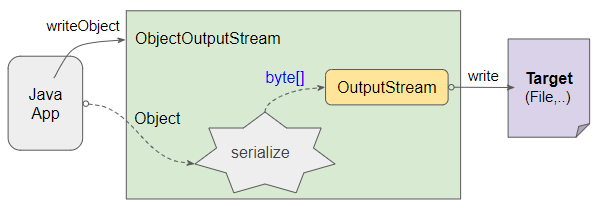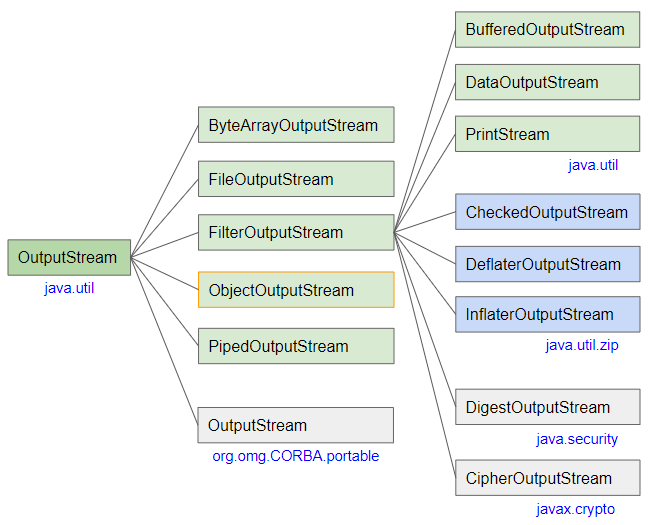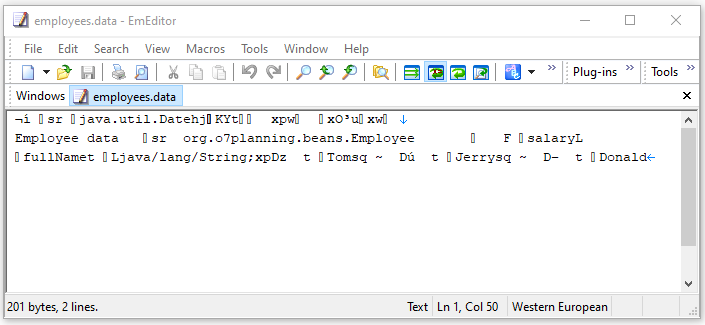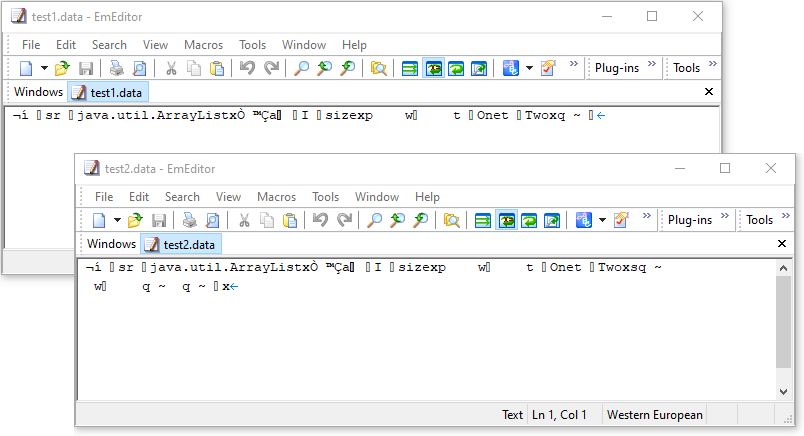Java ObjectOutputStream Tutorial with Examples
1. ObjectOutputStream
ObjectOutputStream is a subclass of OutputStream class, which manages an OutputStream object and provides methods for writing primitive data or objects into OutputStream that it manages.

public class ObjectOutputStream
extends OutputStream implements ObjectOutput, ObjectStreamConstantsObjectInputStream is used to read data sources created by ObjectOutputStream:

- OutputStream
- FilterOutputStream
- ByteArrayOutputStream
- PrintStream
- PipedOutputStream
- BufferedOutputStream
- DataOutputStream
- FileInputStream
- CheckedOutputStream
- CheckedOutputStream
- CipherOutputStream
- DeflaterOutputStream
- DigestOutputStream
- InflaterOutputStream
ObjectOutputStream Methods
public final void writeObject(Object obj) throws IOException
public void writeBoolean(boolean val) throws IOException
public void writeByte(int val) throws IOException
public void writeShort(int val) throws IOException
public void writeChar(int val) throws IOException
public void writeInt(int val) throws IOException
public void writeLong(long val) throws IOException
public void writeFloat(float val) throws IOException
public void writeDouble(double val) throws IOException
public void writeBytes(String str) throws IOException
public void writeChars(String str) throws IOException
public void writeUTF(String str) throws IOException
public void writeUnshared(Object obj) throws IOException
public void writeFields() throws IOException
public void defaultWriteObject() throws IOException
public void useProtocolVersion(int version) throws IOException
public ObjectOutputStream.PutField putFields() throws IOException
public void reset() throws IOException
protected void writeObjectOverride(Object obj) throws IOException
protected void annotateClass(Class<?> cl) throws IOException
protected void annotateProxyClass(Class<?> cl) throws IOException
protected Object replaceObject(Object obj) throws IOException
protected boolean enableReplaceObject(boolean enable) throws SecurityException
protected void writeStreamHeader() throws IOException
protected void writeClassDescriptor(ObjectStreamClass desc) throws IOException
protected void drain() throws IOException
int getProtocolVersion()
void writeTypeString(String str) throws IOException
// Methods Inherited from OutputStream
public void write(int val) throws IOException
public void write(byte[] buf) throws IOException
public void write(byte[] buf, int off, int len) throws IOException
public void flush() throws IOException
public void close() throws IOExceptionObjectOutputStream Constructors
ObjectOutputStream(OutputStream out)Objects need to be serialized before being written to ObjectOutputStream. These objects must implement Serializable interface.
2. Example 1
Employee class implements Serializable interface, which is necessary so that it can be written to ObjectOutputStream.
Employee.java
package org.o7planning.beans;
import java.io.Serializable;
public class Employee implements Serializable {
private static final long serialVersionUID = 1L;
private String fullName;
private float salary;
public Employee(String fullName, float salary) {
this.fullName = fullName;
this.salary = salary;
}
public String getFullName() {
return fullName;
}
public void setFullName(String firstName) {
this.fullName = firstName;
}
public float getSalary() {
return salary;
}
public void setSalary(float lastName) {
this.salary = lastName;
}
}For example, use ObjectOutputStream to write Employee objects to a file.
WriteEmployeeDataEx.java
package org.o7planning.objectoutputstream.ex;
import java.io.File;
import java.io.FileOutputStream;
import java.io.IOException;
import java.io.ObjectOutputStream;
import java.io.OutputStream;
import java.util.Date;
import org.o7planning.beans.Employee;
public class WriteEmployeeDataEx {
// Windows: C:/Data/test/employees.data
private static String file_path = "/Volumes/Data/test/employees.data";
public static void main(String[] args) throws IOException {
File outFile = new File(file_path);
outFile.getParentFile().mkdirs();
Employee e1 = new Employee("Tom", 1000f);
Employee e2 = new Employee("Jerry", 2000f);
Employee e3 = new Employee("Donald", 1200f);
Employee[] employees = new Employee[] { e1, e2, e3 };
OutputStream os = new FileOutputStream(outFile);
ObjectOutputStream oos = new ObjectOutputStream(os);
System.out.println("Writing file: " + outFile.getAbsolutePath());
oos.writeObject(new Date());
oos.writeUTF("Employee data"); // Some informations.
oos.writeInt(employees.length); // Number of Employees
for (Employee e : employees) {
oos.writeObject(e);
}
oos.close();
System.out.println("Finished!");
}
}After running WriteEmployeeDataEx class, we get a file with confusing content. To read its content you must use ObjectInputStream class.

OK, read the file just written in the previous step with ObjectInputStream.
ReadEmployeeDataEx.java
package org.o7planning.objectoutputstream.ex;
import java.io.File;
import java.io.FileInputStream;
import java.io.IOException;
import java.io.InputStream;
import java.io.ObjectInputStream;
import java.util.Date;
import org.o7planning.beans.Employee;
public class ReadEmployeeDataEx {
// Windows: C:/Data/test/employees.data
private static String file_path = "/Volumes/Data/test/employees.data";
public static void main(String[] args) throws IOException, ClassNotFoundException {
File inFile = new File(file_path);
InputStream is = new FileInputStream(inFile);
ObjectInputStream ois = new ObjectInputStream(is);
System.out.println("Reading file: " + inFile.getAbsolutePath());
System.out.println();
Date date = (Date) ois.readObject();
String info = ois.readUTF();
System.out.println(date);
System.out.println(info);
System.out.println();
int employeeCount = ois.readInt();
for(int i=0; i< employeeCount; i++) {
Employee e = (Employee) ois.readObject();
System.out.println("Employee Name: " + e.getFullName() +" / Salary: " + e.getSalary());
}
ois.close();
}
}Output:
Reading file: /Volumes/Data/test/employees.data
Sat Mar 20 18:54:24 KGT 2021
Employee data
Employee Name: Tom / Salary: 1000.0
Employee Name: Jerry / Salary: 2000.0
Employee Name: Donald / Salary: 1200.03. Example 2
Most classes in Java Collection Framework implement Serializable interface, such as ArrayList, LinkedList, HashMap, LinkedHashMap, TreeMap, ... so their object is writable to ObjectOutputStream.
For example, write an ArrayList object to the file.
Note: All elements of ArrayList must be Serializable type.
WriteListEx1.java
package org.o7planning.objectoutputstream.ex;
import java.io.File;
import java.io.FileInputStream;
import java.io.FileOutputStream;
import java.io.IOException;
import java.io.InputStream;
import java.io.ObjectInputStream;
import java.io.ObjectOutputStream;
import java.io.OutputStream;
import java.util.ArrayList;
import java.util.List;
public class WriteListEx1 {
// Windows: C:/Data/test/flowers.data
private static String file_path = "/Volumes/Data/test/flowers.data";
public static void main(String[] args) throws IOException, ClassNotFoundException {
writeFile();
readFile();
}
private static void writeFile() throws IOException {
ArrayList<String> flowers = new ArrayList<String>();
flowers.add("Tulip");
flowers.add("Daffodil");
flowers.add("Poppy");
flowers.add("Sunflower");
flowers.add("Bluebell");
File file = new File(file_path);
file.getParentFile().mkdirs();
OutputStream os = new FileOutputStream(file);
ObjectOutputStream oos = new ObjectOutputStream(os);
// Write a String
oos.writeUTF("A list of flowers");
// Write an Object
oos.writeObject(flowers);
oos.close();
}
@SuppressWarnings("unchecked")
private static void readFile() throws IOException, ClassNotFoundException {
File file = new File(file_path);
file.getParentFile().mkdirs();
InputStream is = new FileInputStream(file);
ObjectInputStream ois = new ObjectInputStream(is);
// Read a String
String info = ois.readUTF();
// Read an Object
List<String> flowers = (List<String>) ois.readObject();
System.out.println(info);
System.out.println();
for (String s : flowers) {
System.out.println(s);
}
ois.close();
}
}Output:
A list of flowers
Tulip
Daffodil
Poppy
Sunflower
Bluebell4. writeFields()
Suppose you have a GameSetting object and you want to write it to ObjectOutputStream, but not all of its fields.
GameSetting.java
package org.o7planning.beans;
import java.io.IOException;
import java.io.ObjectOutputStream;
public class GameSetting implements java.io.Serializable {
private static final long serialVersionUID = 1L;
private int sound;
private int bightness;
private String difficultyLevel;
private String userNote;
public GameSetting(int sound, int bightness, String difficultyLevel, String userNote) {
this.sound = sound;
this.bightness = bightness;
this.difficultyLevel = difficultyLevel;
this.userNote = userNote;
}
public int getSound() {
return sound;
}
public int getBightness() {
return bightness;
}
public String getDifficultyLevel() {
return difficultyLevel;
}
public String getUserNote() {
return userNote;
}
// Do not change name and parameter of this method.
private void writeObject(ObjectOutputStream out) throws IOException {
ObjectOutputStream.PutField fields = out.putFields();
// Write this object with custom fields
fields.put("sound", this.sound < 20 ? 20 : this.sound);
fields.put("bightness", this.bightness < 30 ? 30 : this.bightness);
fields.put("difficultyLevel", this.difficultyLevel);
// Do not write "userNote".
// fields.put("userNote", this.userNote);
out.writeFields();
}
}ObjectOutputStream_writeFields.java
package org.o7planning.objectoutputstream.ex;
import java.io.File;
import java.io.FileInputStream;
import java.io.FileOutputStream;
import java.io.IOException;
import java.io.InputStream;
import java.io.ObjectInputStream;
import java.io.ObjectOutputStream;
import java.io.OutputStream;
import java.util.Date;
import org.o7planning.beans.GameSetting;
public class ObjectOutputStream_writeFields {
// Windows: C:/Data/test/game_setting.data
private static String file_path = "/Volumes/Data/test/game_setting.data";
public static void main(String[] args) throws IOException, ClassNotFoundException {
GameSetting setting = new GameSetting(10, 80, "Hard", "Try game again!");
writeGameSetting(setting);
readGameSetting();
}
private static void writeGameSetting(GameSetting setting) throws IOException {
File file = new File(file_path);
file.getParentFile().mkdirs();
OutputStream os = new FileOutputStream(file);
ObjectOutputStream oos = new ObjectOutputStream(os);
// Write a String
oos.writeUTF("Game Settings, Save at " + new Date());
// Write Object
oos.writeObject(setting);
oos.close();
}
private static void readGameSetting() throws IOException, ClassNotFoundException {
File file = new File(file_path);
file.getParentFile().mkdirs();
InputStream is = new FileInputStream(file);
ObjectInputStream ois = new ObjectInputStream(is);
// Read a String
String info = ois.readUTF();
// Read fields
GameSetting setting = (GameSetting) ois.readObject();
System.out.println("sound: " + setting.getSound());
System.out.println("bightness: " + setting.getBightness());
System.out.println("difficultyLevel: " + setting.getDifficultyLevel());
System.out.println("userNote: " + setting.getUserNote()); // null.
ois.close();
}
}Output:
sound: 20
bightness: 80
difficultyLevel: Hard
userNote: nullSee more about ObjectInputStream.readFields() method:
5. writeUnshared(Object)
writeUnshared(Object) method works similarly to writeObject(Object) method but different in the following situation:
Suppose you want to write "X" object twice to an ObjectOutputStream, what will happen?
|
|
|
|
For example, use writeObject method to write an ArrayList object twice to a file; and use writeUnshared method to write an ArrayList object twice to another file. The second file will have a larger size.
ObjectOutputStream_writeUnshared.java
package org.o7planning.objectoutputstream.ex;
import java.io.File;
import java.io.FileOutputStream;
import java.io.IOException;
import java.io.ObjectOutputStream;
import java.io.OutputStream;
import java.util.ArrayList;
public class ObjectOutputStream_writeUnshared {
// Windows: C:/Data/test/test1.data
private static String file_path1 = "/Volumes/Data/test/test1.data";
private static String file_path2 = "/Volumes/Data/test/test2.data";
public static void main(String[] args) throws IOException, ClassNotFoundException {
writeObjectTest();
writeUnsharedTest();
}
private static void writeObjectTest() throws IOException {
File file = new File(file_path1);
file.getParentFile().mkdirs();
ArrayList<String> list = new ArrayList<String>();
list.add("One");
list.add("Two");
OutputStream os = new FileOutputStream(file);
ObjectOutputStream oos = new ObjectOutputStream(os);
oos.writeObject(list); // Write the first time
oos.writeObject(list); // Write the second time
oos.close();
}
private static void writeUnsharedTest() throws IOException {
File file = new File(file_path2);
file.getParentFile().mkdirs();
ArrayList<String> list = new ArrayList<String>();
list.add("One");
list.add("Two");
OutputStream os = new FileOutputStream(file);
ObjectOutputStream oos = new ObjectOutputStream(os);
oos.writeUnshared(list); // Write the first time
oos.writeUnshared(list); // Write the second time
oos.close();
}
}Output:

Java IO Tutorials
- Java CharArrayWriter Tutorial with Examples
- Java FilterReader Tutorial with Examples
- Java FilterWriter Tutorial with Examples
- Java PrintStream Tutorial with Examples
- Java BufferedReader Tutorial with Examples
- Java BufferedWriter Tutorial with Examples
- Java StringReader Tutorial with Examples
- Java StringWriter Tutorial with Examples
- Java PipedReader Tutorial with Examples
- Java LineNumberReader Tutorial with Examples
- Java PrintWriter Tutorial with Examples
- Java IO Binary Streams Tutorial with Examples
- Java IO Character Streams Tutorial with Examples
- Java BufferedOutputStream Tutorial with Examples
- Java ByteArrayOutputStream Tutorial with Examples
- Java DataOutputStream Tutorial with Examples
- Java PipedInputStream Tutorial with Examples
- Java OutputStream Tutorial with Examples
- Java ObjectOutputStream Tutorial with Examples
- Java PushbackInputStream Tutorial with Examples
- Java SequenceInputStream Tutorial with Examples
- Java BufferedInputStream Tutorial with Examples
- Java Reader Tutorial with Examples
- Java Writer Tutorial with Examples
- Java FileReader Tutorial with Examples
- Java FileWriter Tutorial with Examples
- Java CharArrayReader Tutorial with Examples
- Java ByteArrayInputStream Tutorial with Examples
- Java DataInputStream Tutorial with Examples
- Java ObjectInputStream Tutorial with Examples
- Java InputStreamReader Tutorial with Examples
- Java OutputStreamWriter Tutorial with Examples
- Java InputStream Tutorial with Examples
- Java FileInputStream Tutorial with Examples
Show More